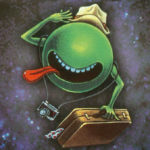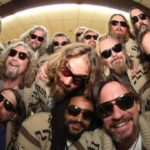Festivism Philosophy
Festivism is a religion inspired by the Festivus tradition which appeared on the popular television show, Seinfeld. Festivism sees religious rituals as largely arbitrary and in the spirit of Bokononism, seeks to replace them with unique and often humorous new customs and traditions. The point of Festivism is that celebration helps encourage human connection and spiritual inspiration, but it doesn’t matter what exactly is being celebrated, or how.
Festivism History
Festivus is a holiday meant as a response to the rampant commercialism inherent in modern Christmas celebrations. Invented by Daniel O’Keefe in the 1960s and celebrated by his family, it was introduced to the world by his son, Dan O’Keefe, a writer for the Seinfeld program.
Rather than a tree, Festivus celebrations might employ an unadorned pole. Common rituals of the day include a customary “airing of grievances,” as well as “feats of strength” and the identification of easily-explainable “Festivus Miracles.” Daniel O’Keefe was keenly aware of the importance of magical (i.e. spiritual) feeling and tradition, as outlined in his 1982 book, “Stolen Lightning: The Social Theory of Magic.”
The original O’Keefe family tradition of Festivus could fall at any time of the year (in Seinfeld, it was celebrated on December 23 to compete with Christmas) and involved many other unusual details and rituals, as outlined in Dan O’Keefe’s book The Real Festivus.
Festivist Practice
Aside from the Festivus traditions showcased on Seinfeld, Festivists are encouraged to come up with their own arbitrary rituals and practices. These can be suggested at the Festivist forum, linked to below.
Festivisms
Many Christmases ago, I went to buy a doll for my son. I reach for the last one they had — but so did another man. As I rained blows upon him, I realized there had to be another way!
— Frank Costanza (Jerry Stiller), “The Strike”, Seinfeld, December 18, 1997
It’s a Festivus for the rest of us!
— Frank Costanza
He was interested in ceremony, ritual, magic and religion … He wanted a holiday mostly that wasn’t political or religious in nature, but based on family… It was very different from the TV holiday … In reality it could happen any damn time of the year, and that’s what made it so terrifying.
— Dan O’Keefe, son of Festivus inventor Daniel O’Keefe
“Have we accidentally invented a cult?”
— Daniel O’Keefe
The holiday evolved during the 1970’s, when the elder Mr. O’Keefe began doing research for his book “Stolen Lightning” (Vintage 1983), a work of sociology that explores the ways people use cults, astrology and the paranormal as a defense against social pressures … Festivus, with classic rituals like familial gatherings, totemic-but-mysterious objects and respect for ancestors, slouched forth from this milieu. “In the background was Durkheim’s Elementary Forms of Religious Life,” Mr. O’Keefe recalled, “saying that religion is the unconscious projection of the group. And then the American philosopher Josiah Royce: religion is the worship of the beloved community.”
— Allen Salkin, “Fooey to the World: Festivus Is Come,” The New York Times, December 19, 2004
For some people the revelation comes too late that life is best kept to the essentials. Some people are given their last rites and that person might say in their last breath, “I should have celebrated Festivus.”
— Jerry Stiller, Foreword to Festivus: The Holiday for the Rest of Us (2005) by Allen Salkin
Festivism Community
Get ordained as a Festivist Minister










